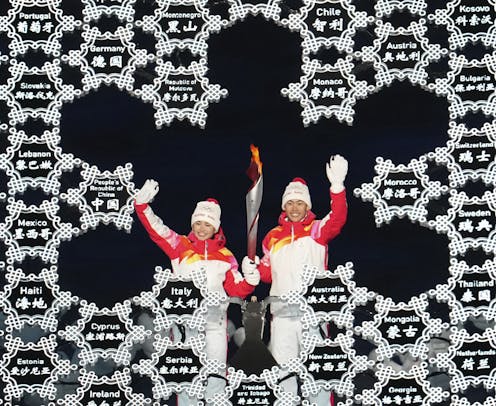Can China use the Beijing Olympics to 'sportwash' its abuses against the Uyghurs? Only if the world remains silent
- Written by Michael Clarke, Visiting Fellow, Australia-China Relations Institute, University of Technology Sydney

Many issues have cast a shadow over the Beijing Winter Olympics in recent weeks, from China’s controversial “zero-COVID” approach[1] to the looming possibility of a Russian invasion of Ukraine[2].
One issue should be getting more attention: what I and other scholars are calling the “Xinjiang emergency[3]” – the mass detention of between one million and two million Uyghurs and other Turkic Muslim minorities in China’s western Xinjiang region.
To many observers, China attempted to sportwash[4] its human rights abuses in Xinjiang by selecting a cross-country skier of Uyghur origin to take part in the lighting of the Olympic cauldron during the opening ceremonies of the games.
Although the move attracted criticism from human rights activists, there’s been virtual silence from governments[5] and corporate sponsors[6] on the Uyghur issue since the Olympics began. Without any real action to put pressure on Beijing, China’s propaganda machine will continue to deflect accountability, instead touting the false narrative that Uyghurs enjoy a “peaceful, harmonious and happy life”.
How China is persecuting the Uyghurs
In a recently published book I edited, The Xinjiang Emergency[7], some of the world’s top scholars on Uyghur history, culture, politics and identity provide a detailed examination of the long-term causes and consequences of China’s repression in Xinjiang.
Moral platitudes or real action?
The failure of the international community to respond to the Uyghurs’ plight speaks to the self interest of governments, multinational corporations[30] and organisations like the International Olympic Committee[31] to retain profitable relations with Beijing. It also shows the hollowness of many governments’ commitments to the much touted “rules-based order”.
Australia’s foreign minister, Marise Payne[32], for example, made this a priority when she said in June 2020 that Australia was committed to the “norms that underpin universal human rights, gender equality and the rule of law”.
Read more: Why the Winter Olympics are so vital to the Chinese Communist Party's legitimacy[33]
This is a sentiment shared by many of the states that have condemned China’s actions in Xinjiang. Yet, it has not been translated into real action likely to increase pressure on Beijing.
Is this trumpeting of a commitment to “universal human rights” little more than a moral platitude? If not, then the international community must ask itself why there has not been stronger action against the largest and most systematic repression of an ethnic or religious minority in the world today.
References
- ^ approach (www.msn.com)
- ^ Russian invasion of Ukraine (warontherocks.com)
- ^ Xinjiang emergency (manchesteruniversitypress.co.uk)
- ^ sportwash (www.nytimes.com)
- ^ governments (www.theatlantic.com)
- ^ corporate sponsors (www.washingtonpost.com)
- ^ The Xinjiang Emergency (manchesteruniversitypress.co.uk)
- ^ remake (warontherocks.com)
- ^ separated (edition.cnn.com)
- ^ invasive (www.aspi.org.au)
- ^ sexual abuse (www.bbc.com)
- ^ forced labor (www.jstor.org)
- ^ How an independent tribunal came to rule that China is guilty of genocide against the Uyghurs (theconversation.com)
- ^ prohibited (supchina.com)
- ^ imposed (www.tandfonline.com)
- ^ razed (www.theguardian.com)
- ^ used financial inducements (supchina.com)
- ^ persecuted (www.nytimes.com)
- ^ erected (theintercept.com)
- ^ cultural genocide (brill.com)
- ^ was the latest to do so (www.france24.com)
- ^ sanctions (www.bbc.com)
- ^ imposed (www.pbs.org)
- ^ diplomatic boycott (www.politico.eu)
- ^ has declared (www.china.org.cn)
- ^ 1936 Berlin Olympics in Nazi Germany (time.com)
- ^ Despite China's denials, its treatment of the Uyghurs should be called what it is: cultural genocide (theconversation.com)
- ^ some Uyghurs have been killed (www.theguardian.com)
- ^ UN Convention on the Prevention and Punishment of the Crime of Genocide (www.un.org)
- ^ multinational corporations (www.chinafile.com)
- ^ International Olympic Committee (www.nytimes.com)
- ^ Marise Payne (www.foreignminister.gov.au)
- ^ Why the Winter Olympics are so vital to the Chinese Communist Party's legitimacy (theconversation.com)
















